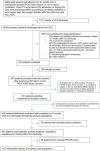Influence of socio-economic status on functional recovery after ARDS caused by SARS-CoV-2: the multicentre, observational RECOVIDS study
- PMID: 37620561
- PMCID: PMC10556111
- DOI: 10.1007/s00134-023-07180-y
Influence of socio-economic status on functional recovery after ARDS caused by SARS-CoV-2: the multicentre, observational RECOVIDS study
Erratum in
-
Correction: Influence of socio-economic status on functional recovery after ARDS caused by SARS-CoV-2: the multicentre, observational RECOVIDS study.Intensive Care Med. 2023 Nov;49(11):1438-1439. doi: 10.1007/s00134-023-07217-2. Intensive Care Med. 2023. PMID: 37755457 Free PMC article. No abstract available.
Abstract
Purpose: Survivors after acute respiratory distress syndrome (ARDS) due to coronavirus disease 2019 (COVID-19) are at high risk of developing respiratory sequelae and functional impairment. The healthcare crisis caused by the pandemic hit socially disadvantaged populations. We aimed to evaluate the influence of socio-economic status on respiratory sequelae after COVID-19 ARDS.
Methods: We carried out a prospective multicenter study in 30 French intensive care units (ICUs), where ARDS survivors were pre-enrolled if they fulfilled the Berlin ARDS criteria. For patients receiving high flow oxygen therapy, a flow ≥ 50 l/min and an FiO2 ≥ 50% were required for enrollment. Socio-economic deprivation was defined by an EPICES (Evaluation de la Précarité et des Inégalités de santé dans les Centres d'Examens de Santé - Evaluation of Deprivation and Inequalities in Health Examination Centres) score ≥ 30.17 and patients were included if they performed the 6-month evaluation. The primary outcome was respiratory sequelae 6 months after ICU discharge, defined by at least one of the following criteria: forced vital capacity < 80% of theoretical value, diffusing capacity of the lung for carbon monoxide < 80% of theoretical value, oxygen desaturation during a 6-min walk test and fibrotic-like findings on chest computed tomography.
Results: Among 401 analyzable patients, 160 (40%) were socio-economically deprived and 241 (60%) non-deprived; 319 (80%) patients had respiratory sequelae 6 months after ICU discharge (81% vs 78%, deprived vs non-deprived, respectively). No significant effect of socio-economic status was identified on lung sequelae (odds ratio (OR), 1.19 [95% confidence interval (CI), 0.72-1.97]), even after adjustment for age, sex, most invasive respiratory support, obesity, most severe P/F ratio (adjusted OR, 1.02 [95% CI 0.57-1.83]).
Conclusions: In COVID-19 ARDS survivors, socio-economic status had no significant influence on respiratory sequelae 6 months after ICU discharge.
Keywords: ARDS; COVID-19; Deprivation; Respiratory sequelae; Socio-economic.
© 2023. The Author(s).
Conflict of interest statement
The authors declare no financial or non-financial interests directly or indirectly related to this work.
References
MeSH terms
Substances
LinkOut - more resources
Full Text Sources
Medical
Miscellaneous


